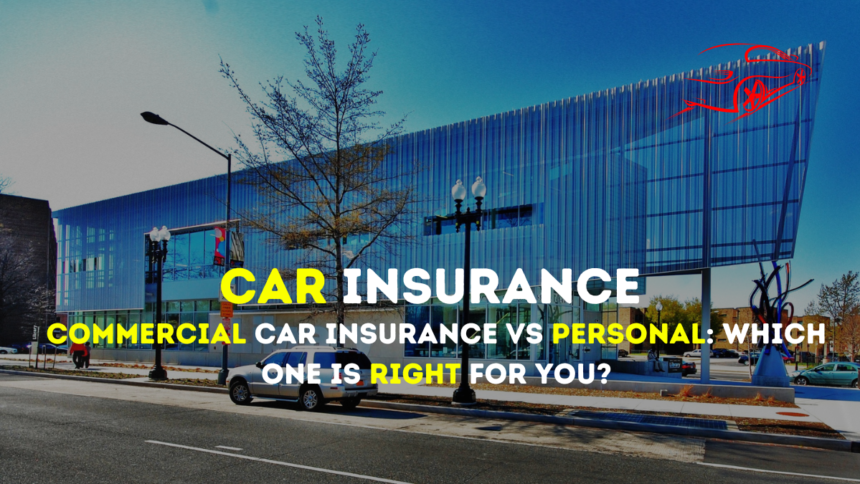Introduction
When it comes to insuring your vehicle, there are two main options to consider: commercial car insurance and personal car insurance. Whether you are an individual looking to insure your personal vehicle or a business owner needing coverage for a fleet of cars, it’s important to understand the differences between these two types of insurance and choose the one that best suits your needs.
Commercial car insurance is specifically designed for business-owned vehicles used for commercial purposes. It provides coverage for liability, physical damage, and other risks associated with operating a business on the road. On the other hand, personal car insurance is intended for privately-owned vehicles used for personal purposes, such as commuting to work or running errands.
Understanding the distinctions between commercial and personal car insurance is crucial to ensuring that you have the right coverage in place. In this article, we will explore the differences between these two types of insurance and help you determine which one is right for you, based on your unique circumstances and insurance needs. So, let’s dive in and find the perfect insurance solution for your vehicle.
Understanding the differences between commercial and personal car insurance
When it comes to car insurance, there are two main types to consider: commercial car insurance and personal car insurance. While both types of insurance provide coverage for your vehicle, there are significant differences between the two that you need to understand.
Commercial car insurance is specifically designed for vehicles that are used for business purposes. This includes cars, trucks, and vans that are owned by a company or used for business-related activities, such as making deliveries, transporting clients, or traveling to job sites. Commercial car insurance provides coverage for liability, physical damage, and other risks associated with operating a business on the road.
On the other hand, personal car insurance is intended for privately-owned vehicles that are used for personal, non-commercial purposes. This includes cars, SUVs, and other vehicles that are used for commuting to work, running errands, or taking family vacations. Personal car insurance typically covers liability, collision, comprehensive, and other standard coverage options.
Factors to consider when deciding between commercial and personal car insurance
When deciding between commercial and personal car insurance, there are several factors to consider. The first and most important factor is how you use your vehicle. If you use your car primarily for business purposes, such as making deliveries, transporting clients, or traveling to job sites, then you will likely need commercial car insurance. On the other hand, if you use your car primarily for personal, non-commercial purposes, such as commuting to work or running errands, then personal car insurance may be the better choice.
Another important factor to consider is the ownership of the vehicle. If the vehicle is owned by a business or used for business purposes, then commercial car insurance is typically required. However, if the vehicle is privately owned and used for personal purposes, then personal car insurance is the appropriate choice.
Additionally, the type of vehicle you drive can also play a role in determining the type of insurance you need. Larger vehicles, such as commercial trucks or delivery vans, may require commercial car insurance, while smaller, privately-owned vehicles may be better suited for personal car insurance.
Benefits and drawbacks of commercial car insurance
One of the primary benefits of commercial car insurance is the level of coverage it provides. Commercial car insurance typically offers higher liability limits, which can help protect your business in the event of an accident. Additionally, commercial car insurance often includes coverage for things like cargo or equipment that may be transported in the vehicle, as well as coverage for any employees who may be driving the vehicle.
Another benefit of commercial car insurance is the potential for tax deductions. Businesses may be able to deduct the cost of their commercial car insurance premiums as a business expense, which can help offset the overall cost of the coverage.
However, one of the potential drawbacks of commercial car insurance is the higher cost. Commercial car insurance is generally more expensive than personal car insurance, as it provides a higher level of coverage and protection for businesses. Additionally, commercial car insurance may have more stringent underwriting requirements, such as the need to provide detailed information about the business, its operations, and the drivers who will be operating the vehicles.

Benefits and drawbacks of personal car insurance
One of the primary benefits of personal car insurance is the lower cost. Personal car insurance is generally less expensive than commercial car insurance, as it provides coverage for personal, non-commercial use of the vehicle. This can be especially beneficial for individuals who are on a tight budget or who only use their vehicle for occasional personal use.
Another benefit of personal car insurance is the simplicity of the coverage. Personal car insurance typically includes standard coverage options, such as liability, collision, and comprehensive coverage, which are easy to understand and navigate. Additionally, personal car insurance policies are often more flexible and can be customized to meet the specific needs of the individual.
However, one of the potential drawbacks of personal car insurance is the limited coverage it provides. Personal car insurance may not offer the same level of protection as commercial car insurance, particularly when it comes to liability coverage or coverage for business-related activities. Additionally, personal car insurance may not provide coverage for things like cargo or equipment that may be transported in the vehicle.
Determining the right type of insurance for your needs
Determining the right type of insurance for your needs can be a complex process, as it depends on a variety of factors. To help you make the best decision, it’s important to carefully consider how you use your vehicle and the specific risks and exposures you face.
If you use your vehicle primarily for business purposes, such as making deliveries, transporting clients, or traveling to job sites, then commercial car insurance is likely the best choice. Commercial car insurance provides the necessary coverage and protection to ensure that your business is protected in the event of an accident or other incident.
On the other hand, if you use your vehicle primarily for personal, non-commercial purposes, such as commuting to work or running errands, then personal car insurance may be the better option. Personal car insurance is generally less expensive and provides the coverage you need for your everyday driving needs.
How to compare commercial and personal car insurance quotes
When comparing commercial and personal car insurance quotes, there are several factors to consider. First and foremost, it’s important to understand the specific coverage options and limits that each policy offers. This includes liability coverage, physical damage coverage, and any additional coverage options that may be relevant to your needs.
Another important factor to consider is the cost of the premiums. Commercial car insurance is generally more expensive than personal car insurance, but the higher cost may be justified by the additional coverage and protection it provides. It’s important to carefully weigh the benefits and drawbacks of each option to determine which one offers the best value for your money.
Finally, it’s important to consider the reputation and financial stability of the insurance provider. When comparing quotes, be sure to research the insurance company’s financial strength, customer service, and claims handling processes to ensure that you are working with a reliable and reputable provider.
Common misconceptions about commercial and personal car insurance
One common misconception about commercial car insurance is that it is only necessary for large businesses with fleets of vehicles. In reality, commercial car insurance can be beneficial for small businesses and self-employed individuals who use their vehicles for business purposes, even if they only have a single vehicle.
Another misconception is that commercial car insurance is more complicated or difficult to understand than personal car insurance. While commercial car insurance may have some additional coverage options and requirements, the basic principles are similar to personal car insurance, and many insurance providers offer streamlined and user-friendly policies.
Finally, some people believe that personal car insurance will cover them if they use their vehicle for business purposes. However, this is not the case. Personal car insurance is specifically designed for non-commercial use, and using a personal vehicle for business purposes without the appropriate commercial coverage can leave you vulnerable to financial liability in the event of an accident.
Frequently asked questions about commercial and personal car insurance
Q: What is the main difference between commercial and personal car insurance?
A: The main difference is that commercial car insurance is designed for vehicles used for business purposes, while personal car insurance is designed for vehicles used for non-commercial, personal purposes.
Q: Do I need commercial car insurance if I only use my vehicle for occasional business-related activities?
A: Yes, if you use your vehicle for any business-related activities, even on an occasional basis, you may need commercial car insurance to ensure that you have the appropriate coverage and protection.
Q: Can I use my personal car insurance policy to cover my business-owned vehicle?
A: No, personal car insurance policies are not designed to cover vehicles used for business purposes. If you use a vehicle for business activities, you will need a commercial car insurance policy.
Q: How much more expensive is commercial car insurance compared to personal car insurance?
A: Commercial car insurance is generally more expensive than personal car insurance, as it provides a higher level of coverage and protection for business-related activities. The exact difference in cost will depend on various factors, such as the type of vehicle, the level of coverage, and the insurance provider.
Q: Can I deduct the cost of my commercial car insurance premiums as a business expense?
A: Yes, in many cases, the cost of commercial car insurance premiums can be deducted as a business expense, which can help offset the overall cost of the coverage.

Conclusion: Choosing the right car insurance for your specific situation
When it comes to car insurance, there is no one-size-fits-all solution. The type of insurance you choose will depend on your specific needs and circumstances, including how you use your vehicle, the type of vehicle you drive, and the level of coverage and protection you require.
If you use your vehicle primarily for business purposes, such as making deliveries, transporting clients, or traveling to job sites, then commercial car insurance is likely the best choice. Commercial car insurance provides the necessary coverage and protection to ensure that your business is protected in the event of an accident or other incident.
On the other hand, if you use your vehicle primarily for personal, non-commercial purposes, such as commuting to work or running errands, then personal car insurance may be the better option. Personal car insurance is generally less expensive and provides the coverage you need for your everyday driving needs.
Ultimately, the decision between commercial and personal car insurance will depend on your unique situation and the specific risks and exposures you face. By carefully considering the factors outlined in this article and comparing quotes from multiple insurance providers, you can make an informed decision and choose the right car insurance solution for your needs.







